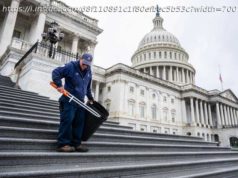 WASHINGTON (AP) — It’s typically an unquestioned honor to participate in the inauguration of an American president. Who wouldn’t want to be part of such a historic event?
WASHINGTON (AP) — It’s typically an unquestioned honor to participate in the inauguration of an American president. Who wouldn’t want to be part of such a historic event?
This time, though, it’s different.
The sharp divisions over Donald Trump ‘s election have politicians, celebrities and even high school students debating whether taking part in the inauguration is a political act that demonstrates support for the new president and his agenda or a nonpartisan tribute to democratic traditions and the peaceful transfer of power.
Among critics of the president-elect, everyone from Hillary Clinton and Hollywood A-listers to the band director at tiny Madawaska Middle/High School in northern Maine and singers in the Mormon Tabernacle Choir is wrestling with this issue — and reaching different conclusions.
Bill and Hillary Clinton served belated notice this past week that they’ll be on the inaugural podium when Trump takes the oath of office Jan. 20. At least two legislators have said they’ll boycott the ceremony.
In Utah, singer Jan Chamberlin was so dismayed by the Mormon Tabernacle Choir’s decision to perform at the swearing-in that she decided not only to sit out the event but to resign from the choir she dearly loves.
«The president-elect does not represent anything that reflects my moral views,» says Chamberlin, who voted for independent Evan McMullin. She said she’s concerned that participation in the inauguration will tarnish the choir by creating a false impression that the church supports Trump.
A fellow choir member, Cristi Brazao, who also didn’t support Trump, posted on her Facebook page that she’ll be singing at the inauguration because «my mission as a singer has always been to soften hearts, to bridge gaps, to make connections and also to make friends. »
Similar debates have played out among the dancers of the Radio City Rockettes and members of the marching band of historically black Talladega College in Alabama after inaugural planners announced that the groups would be performing.
For Ben Meiklejohn , director of the 30-student Pride of Madawaska Marching Band, performing for an inaugural concert at the Lincoln Memorial will give his teenage musicians the experience of a lifetime and has nothing to do with politics. He still remembers when his high school band marched in the 1989 inaugural parade for George H. W. Bush.
«I’ve always thought that music transcends politics, that music can get beyond the barriers that divide people,» says Meiklejohn, who voted for the Green Party ‘s Jill Stein.
Apparently that’s not the case in left-leaning Hollywood, where publicist Howard Bragman says most entertainers see «no separation between Trump the man» and his inauguration, and want nothing to do with him.
Trump denies he’s facing any shortage of top talent.
«The so-called «A» list celebrities are all wanting tixs to the inauguration, but look what they did for Hillary, NOTHING. I want the PEOPLE! » the president-elect tweeted last month.
On Wednesday, he tweeted that album sales for classical teenage singer Jackie Evancho , who has also performed at events with President Barack Obama , had «skykrocketed» after her Dec. 14 announcement that she’ll sing the national anthem at the swearing-in. Her sales did rise after the announcement, and that could be partly due to the inauguration. But it also could be a matter of timing: Christmas albums sell well during the holidays and Evancho appeared on an NBC holiday special Dec. 19.
Participation in an inaugural is always a personal decision, and no doubt people have opted to sit out past inaugurations due to differences with the president-elect.
But historians and others say this year’s public angst over whether to be associated with the inauguration is unusual.
Before the 2001 inauguration of George W. Bush., plenty of people harbored bitter feelings about the recount and Supreme Court ruling that left Republican Bush ahead of Democratic Vice President Al Gore. But former Bush press secretary Ari Fleischer doesn’t recall the same type of debate over whether to participate in the inauguration. He shies away from blaming one party or the other, but laments the greater polarization surrounding what traditionally has been «an American moment. »
«Add this to the long and growing list of things that pull us apart,» says Fleischer.
Inaugural historian Jim Bendat points to bipartisan participation in past inaugurals. Singer Ethel Merman , a prominent Republican, sang at Democrat John F. Kennedy ‘s inaugural gala in 1961. Contralto Marian Anderson sang at the second inaugural of Republican Dwight Eisenhower and at Kennedy’s inauguration.
«It’s really hard to look at this inauguration the same way that we have looked at all others,» says Bendat, author of the inaugural history book, «Democracy’s Big Day. » Many performers «don’t see Donald Trump as the type of person that they want to identify with because of the way that he campaigned for more than a year. »
Robert Reich , a former Bill Clinton administration official, thinks politicians should feel the same way. After the Clintons said they would attend the inauguration, Reich tweeted that «by attending Trump’s inauguration, they’re normalizing it — as if Trump were just another president. »
«The underlying issue here isn’t the normal and noble desire to overcome partisanship and promote a peaceful transition of power,» Reich added in an email. «It’s that Donald Trump became president by lying, demeaning women, denigrating racial and ethnic minorities, denying intelligence reports of foreign intervention in our election, excusing violence against opponents, and undermining the freedom and independence of the press.






